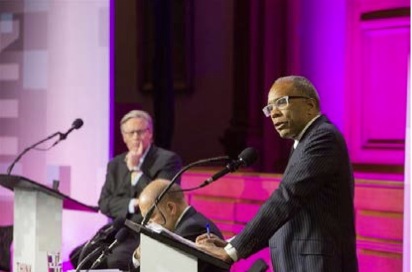In a debate that seemed testy at times, Harvard Law professor Randall Kennedy and three others battled it out in the Ames Courtroom last week over the motion that “affirmative action on campus does more harm than good.”
Kennedy and Columbia Law professor Theodore Shaw argued against the motion, while professors Gail Heriot and Richard Sander—from USD Law and UCLA Law, respectively—argued for it. ABC News correspondent John Donvan served as moderator.
Heriot’s team opposed affirmative action because they believe that it ironically does more harm than good to the very groups it is supposed to help.
“Rick and I are here to make a very narrow point: race preferential admissions policies are doing far more harm than good,” said Heriot. “The very large preferences that are now routinely employed by colleges and universities produce fewer, not more, black scientists, black engineers, and black medical doctors. They produce fewer black college professors and very likely fewer black lawyers.”
According to Heriot and Sander, studies show that groups accepted through affirmative action are less likely to stick with STEM majors than their counterparts at less elite institutions because of a so-called “mismatch” between their credentials and those of white and Asian students.
“We would have a lot more science and engineering minority students graduating with [a] degree if we engaged in race-neutral admissions policies—or at least did not give so great a preference to students,” Heriot said.
Kennedy and Shaw disagreed, with Kennedy pointing out that students who do not receive affirmative action nonetheless have advantages that many minority students lack.
“Some educational institutions see it as part of their mission to do what they reasonably can to assist in rectifying past racial wrongs, aware that mere cessation of invidious racial discrimination will often fail to undo the lingering effects of oppression in the past,” Kennedy said. “These institutions engage in affirmative action to assist racial minority candidates who, though qualified in absolute terms, might otherwise lose out in competition for admission with those advantaged by racial or other sorts of illicit but deeply entrenched privilege.”
Kennedy concluded his opening statements by citing the numerous benefits of affirmative action programs.
“That affirmative action supports the educational missions of institutions of higher education, that it supports their ambition to assist with the task of correcting past and present injustices, that it facilitates racial, gender, class and other sorts of needed integration is more than enough to justify its continuation,” he said.
Despite those arguments, Sander said he remains against affirmative action as it is currently practiced because of the “mismatch theory”—in which students with lower academic credentials are pooled with students with better credentials—described above.
“The typical beneficiary of a preference—well, the typical African-American student at an American law school—has credentials that put them at below 99 percent of the white students… That’s a large preference,” Sander said.
Sander also implied that some minority students would find eliminating affirmative action attractive so that others would not assume they got in “with a racial preference.”
Professor Shaw’s witty response to this comment drew laughter from the audience: “So, mismatch theory, stigmatization… I often think about the fact that, like Professor Kennedy, I am unapologetically a beneficiary of affirmative action. Would I have felt more comfortable in the public housing project—I grew up in the Bronx—knowing that I didn’t get the benefit of affirmative action but had my integrity intact? I don’t think so.”
Before the debate, 22 percent of the audience indicated they agreed with the motion that “affirmative action does more harm than good.” 48 percent disagreed and 30 percent were undecided. After the debate, 36 percent said they supported the statement and 55 percent said they were against, with only 9 percent remaining undecided. Because the winner was determined by the degree of change in opinion, Heriot and Shaw were declared victorious at the end.
The event was sponsored by the American Constitution Society and Harvard Federalist Society and produced by Intelligence Squared, an organization that hosts similar debates monthly. It was broadcast live on the Law School website and will air on National Public Radio.




